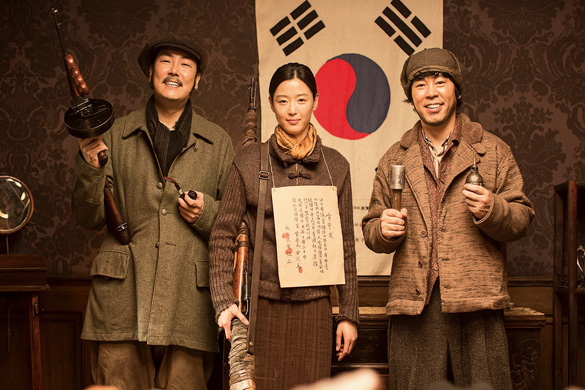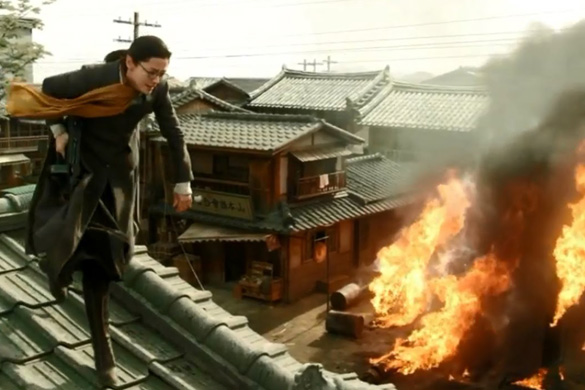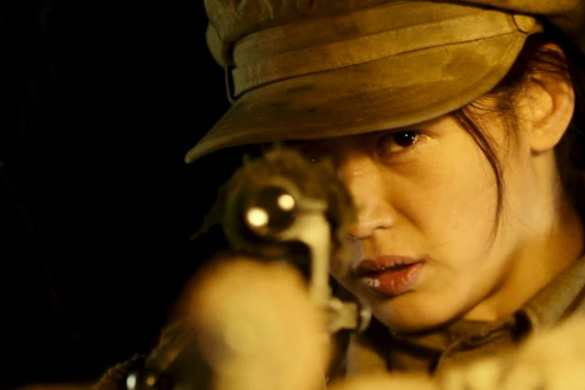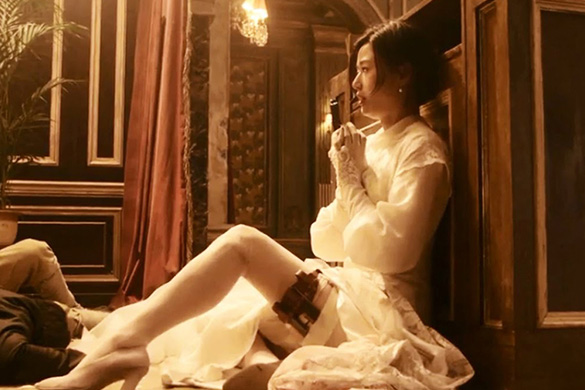Synopsis:
1933, Japan-occupied Korea: Yeom Seok-jin (Lee Jung-jae) - who for years was a freedom fighter opposing the Japanese occupation - is tasked with bringing together three Korean resistance fighters currently in captivity to carry out an assassination; Ahn Ok-yun (Jeon Ji-hyun), a sniper imprisoned for killing her commanding officer; Chu Sang-ok (Cho Jin-woong), a weapons dealer; and Hwang Deok-sam (Choi Deok-moon), a Hungarian-trained explosives expert. Their targets? Japanese army commander Kawaguchi and pro-Japanese Korean businessman Kang In-guk (Lee Kyung-young).
However, as the three assassins intricately plan their patriotic and deeply dangerous mission, they are oblivious to the fact that mercenaries Hawaii Pistol (Ha Jeong-woo) and his sidekick 'Old Man' (Oh Dal-soo) have been hired to find and kill them in turn, leading to hunter becoming hunted in a bullet strewn cat and mouse game that will see loyalties tested, allegiances shifted and blood ties betrayed...
Review:
'Assassination' begins by stepping back to 1911, to show (young) freedom fighter Seok-jin's efforts to kill Kang and the Japanese governor of the time. Having failed, badly injured Seok-jin hides out, Kang's wife promising to help him escape by cover of darkness. Kang - who earlier in this segment has already been shown to be an utterly self-serving individual caring only about the riches that collaborating with the Japanese will bring him - discovers his wife's plans and without hesitation orders his henchmen to follow and kill both her and Seok-jin, demanding only the safe return of his twin daughters (a narrative thread that later becomes pivotal to the entire storyline).
It almost goes without saying that in 'Assassination' those Koreans collaborating with the Japanese in any way, shape or form stand as the 'bad guys' of the piece, as much if not more so (considering their betrayal of their country) than the occupying Japanese themselves.
By contrast, those siding with the resistance - fighting and willing to sacrifice everything for an independent and free Korea - consistently have the noticeable moral high ground even in the case of, for example, explosives expert Deok-sam who in spite of constantly demanding payment for his part in the assassination attempt is clearly involved because he feels it is frankly the right thing to do. These kinds of ideas have been seen on a fair few occasions in historical dramas of late, but thankfully in 'Assassination' they feel far more natural and less 'pushed' than is often the case.
 |
There are three main narrative threads in 'Assassination': The story of the three resistance fighter assassins; that of the two mercenaries sent to kill them; and the ways in which their tales relate to and are affected by Seok-jin. However, within each (not so separate) thread, subplots abound meaning that the overall character count is extensive, to say the least.
As such, though references are made to character back stories, there simply isn't enough time to go into a great deal of character depth, for the most part. Instead, director Choi Dong-hoon concentrates on the history of Seok-jin, Ok-yun, Kang and his offspring but even here back story is largely restricted to short flashbacks and orally related statements.
Not only that, but with a far reaching narrative timeline beginning in 1911 and finishing after the liberation of Korea post Second World War, time is very much of the essence and with so much to cover only a certain amount of running time can be afforded to each section and character.
Some of the quieter moments of 'Assassination' do serve to both highlight the dire plight of ordinary Koreans in the face of Japanese occupation and underline some of the very reasons the resistance continues its seemingly impossible fight: The opulent lifestyle of Kang and his daughter Mitsuko, for example, sitting starkly at odds with the life of utter poverty faced by freedom fighter Ok-yun who is unaware even that sugar can be added to coffee to make it less bitter, having only ever read about it but never having been able to actually taste it. However, these moments, too, take up valuable running time and at this point I guess you probably already know what I'm going to say next:
At the guts of two-and-a-half hours in duration, 'Assassination' is way too long. Considering all of the above, that's no surprise but credit should be given to Choi Dong-hoon for ensuring that this expansive tale never drags nor feels boring. However, there are several points where the film seems to reach what feels like its natural conclusion, only for it to then continue into another related thread or indeed time frame. So much so that at times 'Assassination' (to me) feels almost episodic in nature rather than a singular piece, though it does have to be said that each section is gripping and thoroughly entertaining in its own right.
One thing I do have an issue with, however, occurs in the latter stages of the film. Two main characters face off 'mano a mano', guns blazing, and so begins the battle of the characters that just will not die. You can shoot them point blank once, twice, three times and though they'll fall they'll invariably get up again, still alive and ready for more albeit with blood drooling from their mouths. Heavens, you can even stab them in the heart and hey presto they bounce right back. Compare this with the many gun battles throughout the rest of the film where random bad guys are shot with a single bullet from a distance and fall, motionless for ever more.
This is an idea that has (sadly) presented itself in more than one recent Korean film ('Obsessed' stands guilty as charged) and though I'm fully aware that such plot elements' aim is to increase both drama and tension, for me personally they only undermine believability and ultimately leave me shaking my head, rolling my eyes and saying "Die, already!".
 |
Visually, 'Assassination' is exemplary to the nth degree, stunningly and sumptuously beautiful throughout. From seemingly no expense spared sets to fog rolling majestically through city streets at dusk, the various cityscapes and vistas feel utterly real. Pacing is brisk, rising and falling perfectly depending on whether a shootout scene is taking place or indeed a quieter, character led break from the mayhem. Since 'The Thieves' in 2012, director Choi Dong-hoon has shown he is as comfortable shooting complex, fast moving action as he is with dialogue driven scenes and that certainly continues to be the case in 'Assassination'.
All in all, ‘Assassination’ is rip-roaring entertainment through and through, even considering the above caveats.
So much so, in fact, that in a recent ‘Best Korean Films of 2015’ article I was asked to write for UK-based K-culture website UnitedKpop, I not only included ‘Assassination’ but also happily gave it pride of place.
The ‘Best Korean Films of 2015’ UnitedKpop article is still available at:
http://unitedkpop.com/2015/12/guest-article-top-korean-movies-2015-hangul-celluloid/
A final disclaimer: Since the days of 'Blood: The Last Vampire', any English language credits have named Jeon Ji-hyun as Gianna Jun. As 'Assassination' has its credits in both Korean and English that is also the case here. However, I absolutely refuse to refer to her as Gianna Jun (regardless of the phonetic similarities) since we're talking about a Korean movie here and in Korean language credits she's still referred to as Jeon Ji-hyun, as she should be. A bug bear of mine, I admit, but for me Jeon Ji-hyun always has been, is, and always will be Jeon Ji-hyun, and I make no apology for that whatsoever.
You can read the Hangul Celluloid 2012 interview with director Choi Dong-hoon by clicking here
Summary:
Even from its early stages, it's easy to see why 'Assassination' was such a huge draw at the Korean box office. Sumptuous visuals combine with a gripping narrative to provide out-and-out entertainment, albeit rather overlong and somewhat lacking in character depth.
'Assassination' (암살) / 2015 / directed by Choi Dong-hoon
|





